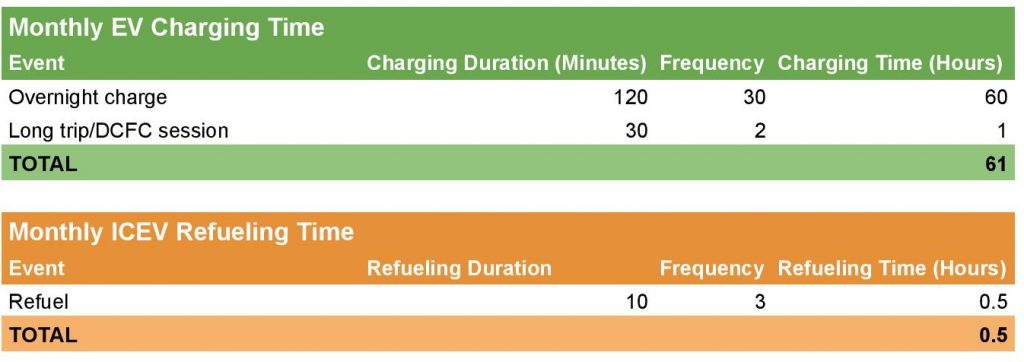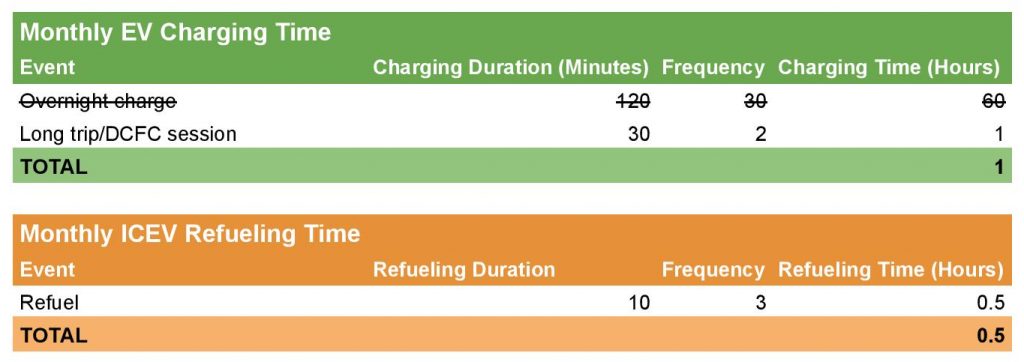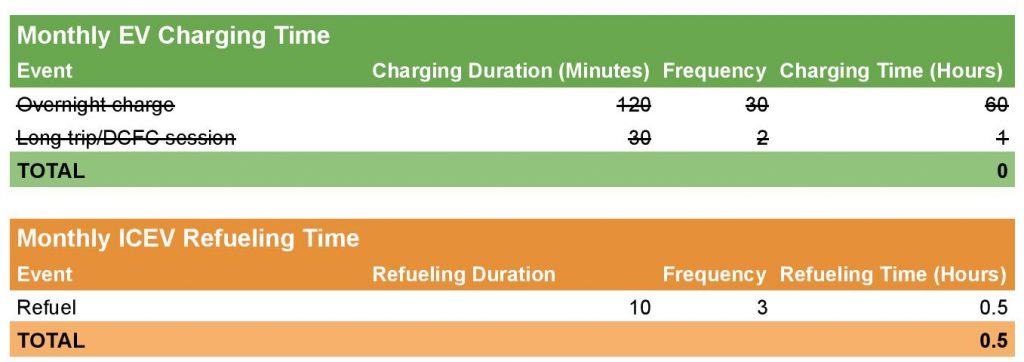One of the very first questions non-electric vehicle (EV) individuals ask about EVs is, “How long does it take to charge?”. That answer depends on several factors: max charging rate of the particular vehicle, all-electric (Battery Electric Vehicle or BEV) or plug-in hybrid (PHEV), level of charging (1, 2, or 3/DCFC), how much range is needed, ambient temperature, and several more.
Rather than listing all the possible charging time scenarios, a simple response of this will suffice: overnight when charging at home (like a cell phone) or 30 minutes when charging at a fast public station.
At first, that response may seem to pale against gas cars (Internal Combustion Engine Vehicles or ICEV) as they can refuel within 10 minutes anywhere, anytime. Currently, that is what makes ICEVs so popular–they are extremely convenient (thought quite the opposite if you consider all the air pollution and greenhouse gas emissions, but that is a discussion for another day).
EV Charging vs Gas Refueling Time
Regardless, if you were to simply compare the worst-case EV charging time vs gas refueling time, the results would heavily favor gas: 10 minutes (gas) > 30 minutes to 10 hours (electric).
If you were to compare the total monthly time using controlled variables (below), the results go even further in the favor of gas.
| Monthly Mileage | 1,000 |
| Typical overnight charge session duration (min) | 120 |
| Typical long trip charge session (DCFC) duration (min) | 30 |
| Typical ICEV MPG | 30 |
| Typical ICEV Tank Size (gal) | 15 |
| Typical refueling duration (min) | 10 |
The monthly total EV charging time is 61 hours. Yikes! That is a ton of time compared at gas with just 30 minutes of refueling spent per month.

However, if you were to look at the monthly numbers but discount overnight charging time since you are not actually waiting for the car to charge, the results actually change quite a bit. In other words, standing idly waiting for your gas car to refuel is not the same as plugging in your electric car to charge overnight while you slept. When discounting time not actually waiting for the car to charge, the EV charging vs gas refueling comparison begins to favor EVs instead. Simply put, EVs actually take less of your time to charge than gas to refuel.
EV Charging vs Gas Refueling Time But Discount Overnight Charging
Since most EV drivers charge overnight at home and since you dont actually sit idle waiting for the car to charge overnight, this time is not counted. Instead, EV drivers do anything else but wait for their car to charge. In fact, over time EV drivers forget how long it takes to charge since it doesnt really matter. All that matters is that you plug in when you get home and wake up to 100% charge, which is enough range to complete 95% of your vehicular trips.
When discounting overnight charging, the actual time spent charging is really one hour. It is still double the amount of time compared to refueling an ICEV, however, it is significantly less than if you were to consider any and all charging sessions throughout the month.

EV Charging vs Gas Refueling Time But Discounting Both Overnight and DCFC Sessions
DC Fast Charging (DCFC) sessions are done on long road trips to charge the electric car to 80% within 30 minutes. These stations are often nearby amenities such as restaurants, restrooms, shopping, and parks. Like all other charging sessions, you never sit by the car while you charge. Instead, you are free to leave the vehicle while it charges and complete other tasks like grabbing a bite to eat.
Therefore, if you were to discount not only overnight charging but also the infrequent DC Fast Charging session during the once-a-month long trip, you effectively cancel out all time spent charging.
As such, EV charging vs gas refueling time comparison gets completely lopsided heavily favoring EVs. By excluding both overnight charging and DCFC sessions since both of these charging events are completed while you are doing other things, the monthly EV charging time is zero minutes. In this example, active time spent charging/refueling favors electric cars since again you must complete a dedicated trip to the gas station and stand by while you actively pump gas. Therefore, on a monthly basis you spend more time refueling than charging.

Closing Thoughts
Of course, everyone’s personal situation may vary. The point is this will give you a general idea of the monthly charging vs refueling time difference. By excluding non-wasted charging time, you effectively cancel out any and all time spent charging an electric car. Therefore, charging an EV will always take less of your time than refueling a gas car.
While it may take longer for the vehicle to charge, it will not take more of your time than an ICEV will. The keyword is “your”. Ultimately, your time is more important than the vehicle’s time. So who cares how long an electric car takes to charge if it doesn’t take any of your time!
Ready to make the transition to EVs? Check out the complete list of Available and Future Electric Cars. The table includes key metrics such as price, range, and maximum charging rate! Plus, it is available as a PDF by signing up to the email list. Subscribers also receive the monthly newsletter to stay up to date with the latest articles.

Hi there! I’m the founder and project manager at Charged Future: the EV charging consultancy. Charged Future helps businesses achieve their EV charging goals. Specifically, I serve as the project manager for your EV charging project, which can save you both time and money! Additionally, I can search and apply to all eligible rebate applications, which can typically cover a large portion of the project cost.


